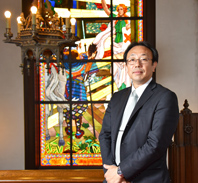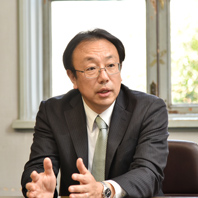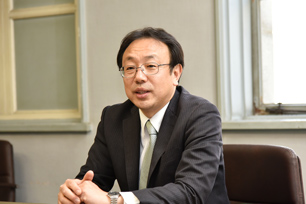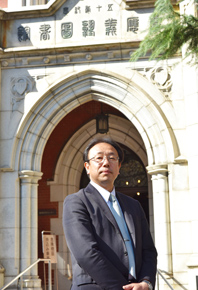Professor Tatsuya Ota, Faculty of Law, Creating a Safer Society—From a Legal Perspective
*Position titles, etc., are those at the time of publishing.
Tatsuya Ota

Prof. Tatsuya Ota graduated from the Department of Law of the Faculty of Law at Keio University in 1986. After majoring in public law at Keio’s Graduate School of Law, he became an Assistant Professor of the Faculty of Law at Keio University in 1994, Associate Professor in 1997, and Professor in 2005. He has also served as a lecturer for the National Police Academy, the Ministry of Justice, and the National Police Agency. His field of specialty includes criminal policy, criminology, victimology, and Asian law. His research on criminal policy focuses on the correction and community supervision of treating offenders and support and protection for the crime victims. For Asian law, he is researching the criminal justice systems of East Asia (especially Korea and Taiwan) and South East Asia. Publications include Partial Suspended Execution of Sentence: Offenders Rehabilitation and Prevention of Re-offending(Keio University Press).
Considering at criminal cases from a broader legal framework

──What is your main area of research in criminal law?
In short, I am studying the criminal justice system and its practice, focusing especially on the areas of criminal policy, victimology, and Asian law. Besides the legal system relating to criminal sanctions and crime prevention, I try to devise measures to support the victims of crime, and in respect to Asian law, I am focusing on the criminal justice systems of ASEAN countries as well as Korea and Taiwan. I am one of the only researchers in this field in Japan. Separate to my research, I am also involved in social activities related to crime prevention and victim support.
──What initially made you interested in criminal justice and victimology?
It was meeting the late Professor Koichi Miyazawa (Professor Emeritus of Keio University) who later became my academic advisor. Prof. Miyazawa was the pioneer to introduce victimology in Japan and was a world-renowned victimologist. Law students usually study the theories about interpretation of legal texts at university, but back then this field of study did not appeal to me very much. This is when I learned about Prof. Miyazawa’s research on criminal policy and victimology, which dealt with public safety and victim support from a legal perspective, and this really aroused my interest.
The study of criminal law is the inquiry into laws that provide crimes and set penalties, and the law of criminal procedure deals with processes such as criminal investigations and trials. Both fields of study look at the application of criminal laws and procedure law to actual cases . In contrast, criminal policy focuses on policies and strategies to reduce crime and multi-discipline field studied from a medical, psychological, and educational perspective. I am approaching criminal policy from the perspective of the legal system.
Considering how the legal system can help prevent crime and protect victims
──So you are conducting research on the treatment of offenders, penalties, and crime prevention?
Yes, that’s right. Criminal policy deals with the treatment of offenders after the crime has taken place, and preventing crimes before they happen. The former investigates the treatment of offenders from when the crime is reported and how it should be handled in different phases of criminal proceedings such as by the police, prosecutors, in court, and at the probation offices, and seeks the most appropriate penalties on criminals and effective measures to prevent reoffending. For example, imposing punishment on every offender is not necessarily solving the problem and sending those who have committed relatively light crimes to prison may make rehabilitation more difficult. For this reason, there are systems in place for “cautioning for minor offenses” and suspended prosecution, which are diverted from criminal procedure without imposing punishment. However, this again does not necessarily mean that we should not impose punishment. What needs to be considered is what kind of offenders should be reintegrated into the society and the best way to do so. In recent years, a model project was introduced to give welfare support for offenders on suspended prosecution.
On the other hand, even if the offender is sentenced to imprisonment, one third of parolees and almost half of those released on expiry of sentence are re-sentenced to imprisonment within five years. Giving guidance and supervising ex-inmates within those five years when the risk of reoffending is high would reduce the rate of recidivism, but under the present system, the period of parole supervision is extremely short and offenders released on expiry of sentence are not under any community supervision. Therefore, in order to give guidance and supervision, not just in prison but also in the outside society, the “partially suspended execution of imprisonment” system was introduced as a part of penal reform, which was one of the most extensive amendment since its enactment in 1907. Offenders are required to execute the initial portion of the sentence in prison while the remaining portion is suspended for certain term within one to five years with or without community supervision. This kind of punishment is also part of my research.
As mentioned above, criminal policy also deals with crime prevention, and part of the study is environmental criminology, which looks at preventing criminal behavior by altering the physical—social and living—environment. For example, some countries are implementing crime-reduction measures by making the street lamps brighter or changing the rout of major road that connect cities in order to reduce crimes in cities. In spite of insufficient scientific evidence, installing CCTV in city is another measure for crime prevention.

──Is victimology about victim support?
Initially, victimology was a field of study that proposed to reduce the number of crime victims by investigating the process and causes of victimization from the perspective of what kind of people are prone to become victims. Later, it developed into a field of study that incorporated research and activities related to victim support, which focused attention on the support system of victims, including financial support, victim notification, and attendance at criminal procedure including trials.
Within victimology, I am focusing on the legal support of victims. For instance, the act of “following” is in itself not a criminal offense, but now the police are able to issue a written warning to perpetrators for such behaviors. If the behavior does not stop, the Prefectural Community Safety Commission can then issue a restraining order. Violation of this order is a crime punishable by imprisonment or fine. Almost 80 percent of following behavior can be prevented through written warnings and restraining orders. However, 20 percent of stalkers continue to harass their victims, and at times their behavior escalates as their hatred and bitterness toward the victims grow. Protection of victims through legal measures is one aspect of victimology, and I am studying these problems while serving as a member of governmental committee.
——You are also conducting research on Asian law. What is the purpose of your research?
The modern legal system of Japan was subject to influence of the French and German, and after the war, the American legal systems. Therefore, in Japan, the predominant research on overseas legal systems is that of Europe and North America. However, for example, most illegal drugs in Japan are smuggled in from overseas including countries in Asia. Japan is not a stranger to the problem of human trafficking either, so it is imperative that we work closely with other countries in Asia. Moreover, when we consider the culture and social background of Japan, I believe there is a more suitable legal system to be found in Asian systems rather than those of Europe and North America. The study of Asian law is necessary in solving very real, global issues that we face today as well as in our search for a model that is more suited to Japan. Also, occasionally in Asia, there are drastic amendments to the law, which would be unimaginable in Europe and North America. For example there is a law in Korea that allows the court to order sex offenders to be subjected to chemical castration for a maximum of fifteen years after release from prison. I am not saying that the adoption of the same law should be considered in Japan, but I think knowing about such measures taken in other countries will allow us to take a fresh new look at our own legal system.
Use what you have learned from actual experiences to continue thinking about issues that have no easy answers

——I heard that you take your students to visit prisons and rehabilitation facilities like half-way houses.
When studying the theory of criminal policy, it is extremely important to see the actual sites and facilities, so I organize visits to prisons and juvenile training schools as part of our excursions for my seminar class. No matter how many essays and papers you read, you cannot possibly know how hot or cold it gets in prison, the smell of prison, or the taste of prison food. The prison environment has improved compared to how it was in the past, but still, prisons have a distinct odor. Students are surprised at how hot it is when I take them in summer. Of course, as a place for punishment, there is no air conditioning. And apart from the cold regions of Japan, there is no heating in winter. I would like the students to gain more insight and awareness of various issues by seeing what it is really like in these places.
In my lectures, I occasionally invite families of homicide victims to talk about their stories. There are some horrifying stories that are too unbearable to listen to. Many start crying and some feel unwell and leave the room. The news is full of stories about crime, but not many students have actually thought about what it means when someone is murdered and what terrible and difficult situations the families of the victims are forced into. Students cannot extend their thoughts to the sufferings of the victims just by studying legal interpretation. So that is precisely why we must listen to these stories as a starting point to understand how unjust crimes are and think in earnest about what the Japanese legal system can do and cannot do.
——So, you mentioned that students are able to build awareness of different issues by being exposed to real-life settings.
That’s right. I was struck when a family member of a homicide victim said, “I couldn’t bear the sight of the inmates enjoy themselves as they played softball in prison.” From the perspective of health management and human rights, prisoners must be given exercise time every day, which is something I never questioned, but for the family this was a very painful and intolerable sight. The same thing can be said for parole. For the victims’ families, releasing offenders on parole before the expiry of their sentence is not an easy thing to accept. However, even if the inmate is not granted parole, the inmate is released just a few months or half a year later after serving their full sentence. It means that they will not be under any supervision or guidance outside prison. The criminal justice system was not put in place to take revenge on the offenders on behalf of the victims, and it must never be so, but I believe that it must be a judicial system that has sufficient confidence and understanding from the victims and takes into account their pain and suffering.
The world is filled with problems that have no easy answers. Issues related to criminal policy and victim support are some of them. However, learning starts from seeking answers and solutions to problems we cannot even pinpoint. I would like my students to use their awareness of various issues gained from the field trips, to think from different standpoints, and to train themselves to think freely. The uncertainty of the situation in which we are unable to find solutions gives us the energy and drive for tomorrow. We continue to put forth ideas and suggestions, and we deepen our inquiry through the feedback we receive. This is what my former professor, Koichi Miyazawa, taught me, and this is what I would like to pass on to my students.
*This article appeared in "Kenkyu Saizensen" (May 1, 2015) of Keio University Japanese Website.
*Position titles, etc., are those at the time of the interview.
